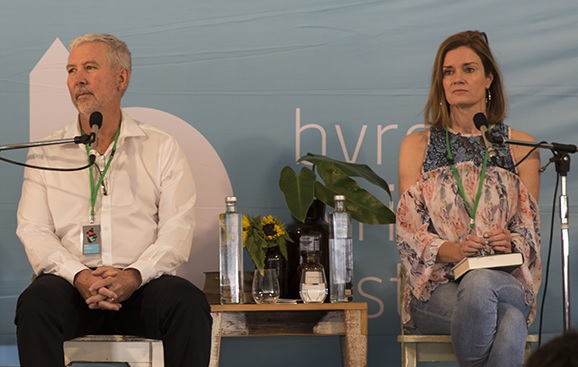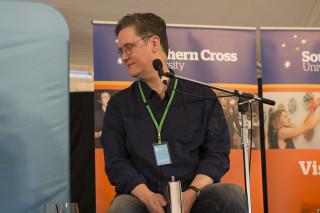Journey to the past: there’s value in history

What is the value of history in a world so concerned with the future?
For the three authors in the Journey to the Past session at Byron Writers Festival 2017, history is invaluable. Each of them chose to research very different moments in history.
Journalist and author Ian Townsend investigated a lesser-known moment in Australia’s World War II history in Line of Fire. It follows the story of a family of Australians, including their 11-year-old boy, in Rabaul, Papua New Guinea who were executed by the Japanese on allegations of espionage.
Townsend mentioned that very few people know about this event, nor do they know that nearly 2000 Australians died in Rabaul during the war. He said the fact that this is not part of the Australian national consciousness was of great interest to him.
Due to the lack of recorded media documenting this event, Townsend was faced with a challenge in finding pertinent information for his research. Luckily, he was able to track down living extended members of the family executed in Rabaul. Having these people’s knowledge as a resource allowed Townsend to piece together this fragmented and obscured incident. Some of these family members were in the audience at the session.
Where facts are lacking, myths sometimes intervened. Journalist/historian and co-presenter of ABC’s The Drum, Julia Baird sought to separate fact from fiction in Victoria: The Woman Who Made the Modern World.
Indeed, Baird’s research helped to displace common misconceptions about Queen Victoria, including that fabled quote ‘we are not amused’.
‘This woman has been buried in plain view,’ said Baird.
Aside from the myths, Baird mentioned also being interesting in Victoria’s status as a woman in a position of power. Through her research, Baird discovered that Victoria was more than simply severe or secondary to Prince Albert, she was ‘lively, robust’ and ‘passionate’ about fighting for power.

Ghost Empire is the result of a shared love of history of radio presenter and writer Richard Fidler and his son. Together they went to Istanbul (formerly Constantinople and Byzantium) to learn about the city’s past.
Fidler referred to a ‘great sense of undiscovered-ness’ around the Byzantine Empire that he wanted to discover with his son.
Part of his inquiry was led by a tendency for ‘the West’ to overlook the continued flourishing of the Roman Empire in ‘the East’ following the fall of Rome. The fixation with history as being contained only in the West is, according to Fidler, largely to do with Western chauvinism. This comment drew laughter from the crowd.
So, is history is always written by the victors?
Townsend maintained that this is often the case, especially with military history, and this can create an exclusionary narrative where some things are overlooked or forgotten.
Baird added that history is not only is it written by the victors, it has mostly been written by ‘the blokes’. It is only in recent times that this is being rectified and the stories of women are being restored in historical discourse.
Ghost Empire gives an account of the fall of Constantinople to the Ottomans which was, for Fidler, one of the most ‘moving and electrifying’ moments in its history. In this case, the history was in fact written by the losers.
Drawing on Henry Ford’s infamous controversial assertion that history is ‘more or less bunk’, session chair Edna Carew asked the panel members what their thoughts on this statement were.
‘Henry Ford was a great galloping arsehole’, which was only a partial joke. He referred to Ford’s invention of an international anti-Jewish conspiracy and the regressive political beliefs of Donald Trump as examples of people who pick and choose history.
‘History is us!’ Townsend exclaimed, noting that we, as a nation, need to be careful about what we choose to remember or forget.
In the case of Rabaul – an incident that should perhaps be remembered as an important, tragic but overlooked part of Australian history – and his book Line of Fire seeks to bring it to the forefront of historical discussion.
Baird said that in some cases, yes, history is bunk and is both an act and a discipline. Yet history – as something active that can be interrogated – should , according to Baird, be constantly contested and re-discovered.
‘Without history, you’re a blithering idiot,’ Fidler quipped, one again drawing laughs and applause.
Lachlan Rutherford is a Southern Cross University Honours Graduate in Creative Writing. He is currently studying a Bachelor of Social Science.
